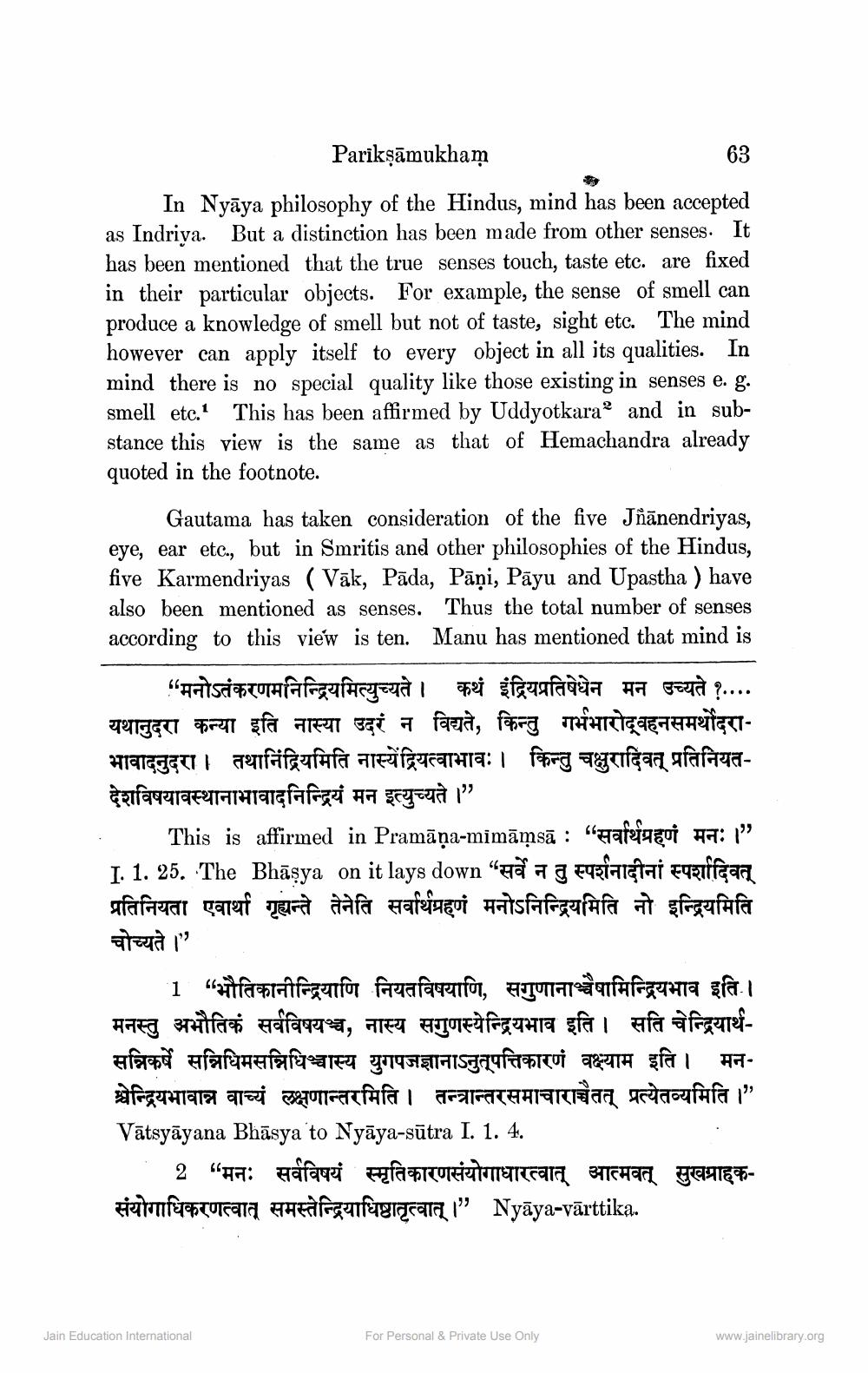________________
63
Parikşāmukham In Nyāya philosophy of the Hindus, mind has been accepted as Indriya. But a distinction has been made from other senses. It has been mentioned that the true senses touch, taste etc. are fixed in their particular objects. For example, the sense of smell can produce a knowledge of smell but not of taste, sight etc. The mind however can apply itself to every object in all its qualities. In mind there is no special quality like those existing in senses e. g. smell etc.1 This has been affirmed by Uddyotkara' and in substance this view is the same as that of Hemachandra already quoted in the footnote.
Gautama has taken consideration of the five Jňānendriyas, eye, ear etc., but in Smritis and other philosophies of the Hindus, five Karmendriyas (Vāk, Pāda, Pāņi, Pāyu and Upastha ) have also been mentioned as senses. Thus the total number of senses according to this view is ten. Manu has mentioned that mind is
"मनोऽतंकरणमनिन्द्रियमित्युच्यते। कथं इंद्रियप्रतिषेधेन मन उच्यते ?.... यथानुदरा कन्या इति नास्या उदरं न विद्यते, किन्तु गर्भभारोद्वहनसमर्थोदराभावादनुदरा। तथानिंद्रियमिति नास्येंद्रियत्वाभावः। किन्तु चक्षुरादिवत् प्रतिनियतदेशविषयावस्थानाभावादनिन्द्रियं मन इत्युच्यते ।”
This is affirmed in Pramāna-mimamsa : "सर्वार्थग्रहणं मनः ।" I. 1. 25. The Bhāsya on it lays down “सर्वे न तु स्पर्शनादीनां स्पर्शादिवत् प्रतिनियता एवार्था गृह्यन्ते तेनेति सर्वार्थग्रहणं मनोऽनिन्द्रियमिति नो इन्द्रियमिति चोच्यते ।"
1 "भौतिकानीन्द्रियाणि नियतविषयाणि, सगुणानाञ्चैषामिन्द्रियभाव इति । मनस्तु अभौतिकं सर्वविषयञ्च, नास्य सगुणस्येन्द्रियभाव इति । सति चेन्द्रियार्थसन्निकर्षे सन्निधिमसन्निधिञ्चास्य युगपजज्ञानाऽनुत्पत्तिकारणं वक्ष्याम इति। मनश्वेन्द्रियभावान्न वाच्यं लक्षणान्तरमिति । तन्त्रान्तरसमाचाराच्चैतत् प्रत्येतव्यमिति ।" Vātsyāyana Bhāsya to Nyāya-sūtra I. 1. 4.
2 "मनः सर्वविषयं स्मृतिकारणसंयोगाधारत्वात् आत्मवत् सुखग्राहकसंयोगाधिकरणत्वात् समस्तेन्द्रियाधिष्ठातृत्वात् ।" Nyaya-varttika.
Jain Education International
For Personal & Private Use Only
www.jainelibrary.org




